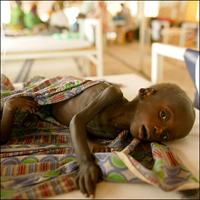Cholera and malnutrition add to the extreme suffering in North Kivu, DRC

Access to health care for these people was already weak, but is even more limited today. The fighting has forced several aid organisations to suspend their activities, and health centres are not getting any supplies, or are deserted by the medical staff. Displaced people cannot farm their land or access their food stocks, meaning that displaced people lose their only means of subsistence.
Goma - Médecins Sans Frontières (MSF) is sounding the alarm about the situation in North Kivu, where people are living in a state of extreme vulnerability.
The ongoing displacement of the population has increased as the armed conflict has intensified in this province of eastern DRC. The humanitarian situation is deteriorating, as demonstrated by malnutrition and the spread of cholera in different regions of North Kivu.
"We are witnessing an alarming situation in our medical programmes in Masisi and Rutshuru Districts," says Colette Gadenne, Head of Mission for MSF. "Many displaced people have had to flee several times in the last few years and are now completely exhausted. The difficulty in accessing care, malnutrition, epidemics and violence against civilians all mean that people here are very vulnerable."
Since mid-November, tens of thousands of displaced people have arrived in Masisi, Kitchanga, Rutshuru, Nyanzale and Goma. Access to health care for these people was already weak, but is even more limited today. The fighting has forced several aid organisations to suspend their activities, and health centres are not getting any supplies, or are deserted by the medical staff.
Displaced people cannot farm their land or access their food stocks, meaning that displaced people lose their only means of subsistence. Lack of food inevitably results in malnutrition. In its projects, MSF is treating a high number of young children who are suffering from moderate and severe malnutrition. In Nyanzale, 125 severely malnourished children are admitted each month. Since opening a nutritional programme in Masisi in mid-October, MSF has treated 700 malnourished children and about 50 are currently hospitalised. MSF is concerned that the situation will get worse in the next few weeks.
In Rutshuru, today's misery is cholera. MSF started working in Rutshuru in 2005. This is the first time that medical teams have experienced a cholera epidemic in this area. Since mid-November, more than 1,200 people have been treated and many more continue to arrive. Without treatment cholera can be fatal in 50 per cent of cases.
"New displacement has meant that the population of Rutshuru has doubled in the space of a month," says Augustin Augier, MSF's Project Coordinator in Rutshuru. "As a result, the quantity of available water per person has decreased and hygiene conditions have deteriorated, which has fuelled the spread of cholera."
In the Goma area, MSF has treated more than 1,600 cholera patients since September. More than 45,000 people are living in camps to the west of Goma. Although the camps are easily accessible, humanitarian aid is still insufficient and people living there complain about the lack of food.
In Masisi and Rutshuru hospitals, 360 war wounded, both civilians and military, have been treated since September. MSF also provides care to victims of sexual violence in Kitchanga, Rutshuru and Masisi. In total more than 2,900 victims have received care in 2007.
MSF works in Masisi and Rutshuru Districts, where it is often the only international organisation present.
"Even though we work as close as possible to the conflict zones and face huge humanitarian needs, the fighting and insecurity leaves thousands of people out of reach", explains Philippe Havet, Coordinator for MSF in Masisi. "We are deeply worried for all those who are cut off from aid, trapped in the armed conflict".
- CHAD: Chronic malnutrition worse in west than in conflict zone
- CHAD: Floods hit refugees and displaced in east
- Top ten most underreported humanitarian stories of 2007 - Conditions worsen in eastern Democratic Republic of Congo
- SENEGAL: Calls for more prevention as cholera cases rise
- KENYA: Polls turned neighbours into enemies
 Back and Next - Back and Next
Back and Next - Back and Next See Also - See Also
See Also - See Also